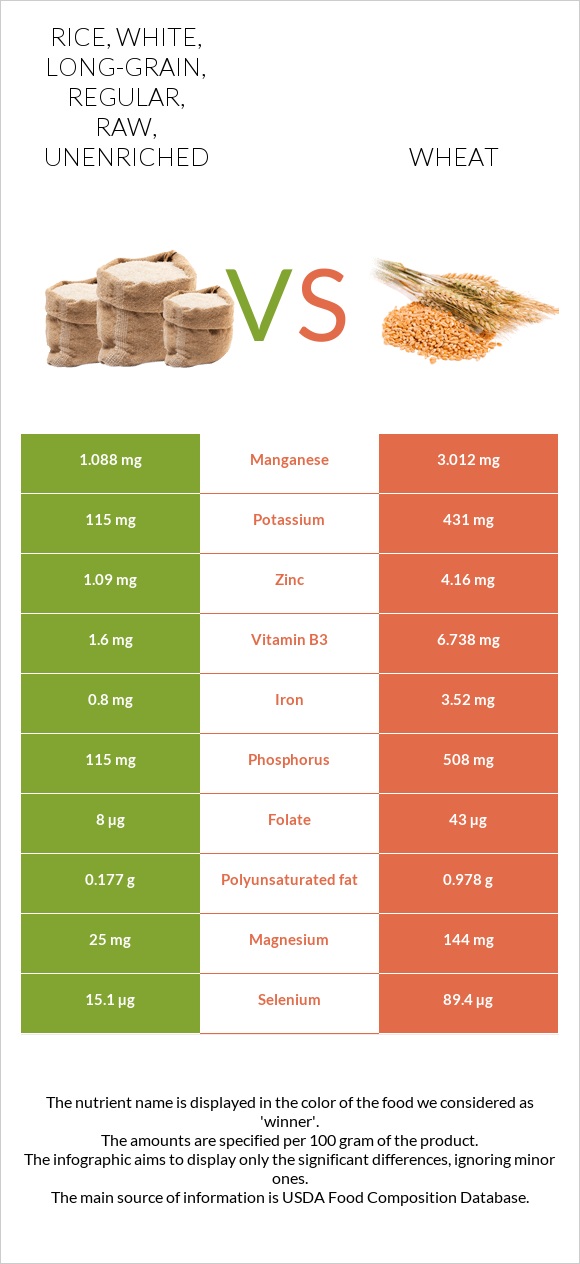Rice, white, long-grain, regular, raw, unenriched vs. Wheat — In-Depth Nutrition Comparison
Compare
Significant differences between rice, white, long-grain, regular, raw, unenriched and wheat
- The amount of selenium, manganese, phosphorus, copper, iron, vitamin B3, vitamin B1, magnesium, zinc, and vitamin B6 in wheat is higher than in rice, white, long-grain, regular, raw, unenriched.
- Wheat covers your daily selenium needs 135% more than rice, white, long-grain, regular, raw, unenriched.
Specific food types used in this comparison are Rice, white, long-grain, regular, raw, unenriched and Wheat, durum.
Infographic

Infographic link
Mineral Comparison
Mineral comparison score is based on the number of minerals by which one or the other food is richer. The "coverage" charts below show how much of the daily needs can be covered by 300 grams of the food.
| Contains more MagnesiumMagnesium | +476% |
| Contains more CalciumCalcium | +21.4% |
| Contains more PotassiumPotassium | +274.8% |
| Contains more IronIron | +340% |
| Contains more CopperCopper | +151.4% |
| Contains more ZincZinc | +281.7% |
| Contains more PhosphorusPhosphorus | +341.7% |
| Contains less SodiumSodium | -60% |
| Contains more ManganeseManganese | +176.8% |
| Contains more SeleniumSelenium | +492.1% |
Vitamin Comparison
Vitamin comparison score is based on the number of vitamins by which one or the other food is richer. The "coverage" charts below show how much of the daily needs can be covered by 300 grams of the food.
| Contains more Vitamin EVitamin E | +∞% |
| Contains more Vitamin KVitamin K | +∞% |
| Contains more Vitamin B1Vitamin B1 | +498.6% |
| Contains more Vitamin B2Vitamin B2 | +146.9% |
| Contains more Vitamin B3Vitamin B3 | +321.1% |
| Contains more Vitamin B6Vitamin B6 | +155.5% |
| Contains more FolateFolate | +437.5% |
All nutrients comparison - raw data values
| Nutrient |  |
 |
DV% diff. |
| Selenium | 15.1µg | 89.4µg | 135% |
| Manganese | 1.088mg | 3.012mg | 84% |
| Phosphorus | 115mg | 508mg | 56% |
| Copper | 0.22mg | 0.553mg | 37% |
| Iron | 0.8mg | 3.52mg | 34% |
| Vitamin B3 | 1.6mg | 6.738mg | 32% |
| Vitamin B1 | 0.07mg | 0.419mg | 29% |
| Magnesium | 25mg | 144mg | 28% |
| Zinc | 1.09mg | 4.16mg | 28% |
| Vitamin B6 | 0.164mg | 0.419mg | 20% |
| Protein | 7.13g | 13.68g | 13% |
| Potassium | 115mg | 431mg | 9% |
| Folate | 8µg | 43µg | 9% |
| Vitamin B2 | 0.049mg | 0.121mg | 6% |
| Fiber | 1.3g | 5% | |
| Polyunsaturated fat | 0.177g | 0.978g | 5% |
| Fats | 0.66g | 2.47g | 3% |
| Carbs | 79.95g | 71.13g | 3% |
| Vitamin B5 | 1.014mg | 0.935mg | 2% |
| Calories | 365kcal | 339kcal | 1% |
| Calcium | 28mg | 34mg | 1% |
| Vitamin E | 0.11mg | 1% | |
| Choline | 5.8mg | 1% | |
| Saturated fat | 0.18g | 0.454g | 1% |
| Net carbs | 78.65g | 71.13g | N/A |
| Sugar | 0.12g | N/A | |
| Sodium | 5mg | 2mg | 0% |
| Vitamin K | 0.1µg | 0% | |
| Monounsaturated fat | 0.206g | 0.344g | 0% |
| Tryptophan | 0.083mg | 0.176mg | 0% |
| Threonine | 0.255mg | 0.366mg | 0% |
| Isoleucine | 0.308mg | 0.533mg | 0% |
| Leucine | 0.589mg | 0.934mg | 0% |
| Lysine | 0.258mg | 0.303mg | 0% |
| Methionine | 0.168mg | 0.221mg | 0% |
| Phenylalanine | 0.381mg | 0.681mg | 0% |
| Valine | 0.435mg | 0.594mg | 0% |
| Histidine | 0.168mg | 0.322mg | 0% |
Macronutrient Comparison
Macronutrient breakdown side-by-side comparison
Protein:
7.13 g
Fats:
0.66 g
Carbs:
79.95 g
Water:
11.62 g
Other:
0.64 g
Protein:
13.68 g
Fats:
2.47 g
Carbs:
71.13 g
Water:
10.94 g
Other:
1.78 g
| Contains more CarbsCarbs | +12.4% |
| Contains more ProteinProtein | +91.9% |
| Contains more FatsFats | +274.2% |
| Contains more OtherOther | +178.1% |
~equal in
Water
~10.94g
Fat Type Comparison
Fat type breakdown side-by-side comparison
Saturated fat:
Sat. Fat
0.18 g
Monounsaturated fat:
Mono. Fat
0.206 g
Polyunsaturated fat:
Poly. Fat
0.177 g
Saturated fat:
Sat. Fat
0.454 g
Monounsaturated fat:
Mono. Fat
0.344 g
Polyunsaturated fat:
Poly. Fat
0.978 g
| Contains less Sat. FatSaturated fat | -60.4% |
| Contains more Mono. FatMonounsaturated fat | +67% |
| Contains more Poly. FatPolyunsaturated fat | +452.5% |